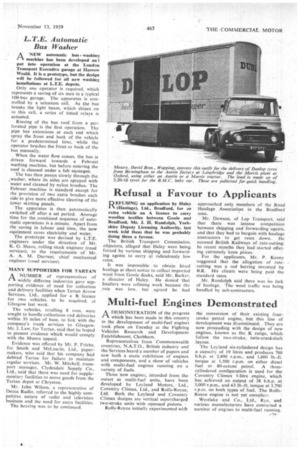L.T.E. Automatic Bus Washer
Page 79

If you've noticed an error in this article please click here to report it so we can fix it.
riA NEW automatic bus washing machine has been developed an] put into operation at the London Transport Executive garage at Harrow Weald. It is a prototype, but the design will be followed for all new washing installations at L.T.E. depots.
Only one operator is required, which represents a saving of six men in a typical 100-bus garage. The apparatus is controlled by a selenium cell. As the bus breaks the light beam, which shines on to this cell, a series of timed relays is actuated.
Rinsing of the bus roof from a perforated pipe is the first operation. The pipe has extensions at each end which spray the front and back of the vehicle for a predetermined time, while the operator brushes the front or hack of the bus manually.
When the water flow ceases. the bus is driven forward towards a Februat washing machine, but before entering the roof is cleaned under a felt squeegee.
The bus then passes slowly through the ,washer, where its sides are sprayed with water and cleaned by nylon brushes. The Februat machine is standard except for the provision of two extra brushes each side to give more effective Cleaning of the lower skirting panels.
The apparatus is then automatically switched off after a set period. Average time for the combined sequence of autoinatic operations is a minute. Apart from the saving in labour and time, the new equipment saves electricity and water.
The prototype was devised by L.T.E. engineers under the direction of Mr. K. G. Shave, rolling stock engineer (road services), to the requirements of Mr. A. A. M. Durrant, chief mechanical engineer (road services).
MANY SUPPORTERS FOR TARTAN
riA NUMBER of representatives of widely differing industries gave supporting evidence of need for collection and delivery facilities when Tartan Arrow Services, Ltd., applied for a B licence for two vehicles, to be acquired, at Glasgow last week.
The vehicles, totalling 8 tons, were sought to handle collections and deliveries within 39 miles of base, to link with the company's trunk services to Glasgow. Mr. J. Law, for Tartan, said that he hoped to present evidence which would -comply with the Munro appeal.
Evidence was offered by Mr. P. Friebe, for Smith and MeLaurin, Ltd., papermakers, who said that his company had debited Tartan for failure to maintain regular services. Mr. W. Mitchell. transport manager, Clydesdale Supply Co., Ltd., said that there was need for supplementary facilities to move goods from the Tartan depot at Chryston.
Mr. John Wilson, a representative of Decca Radio, referred to the highly competitive nature of radio and television business and the need for extra facilities.
The hearing was to be continued.
































































































































































































































































